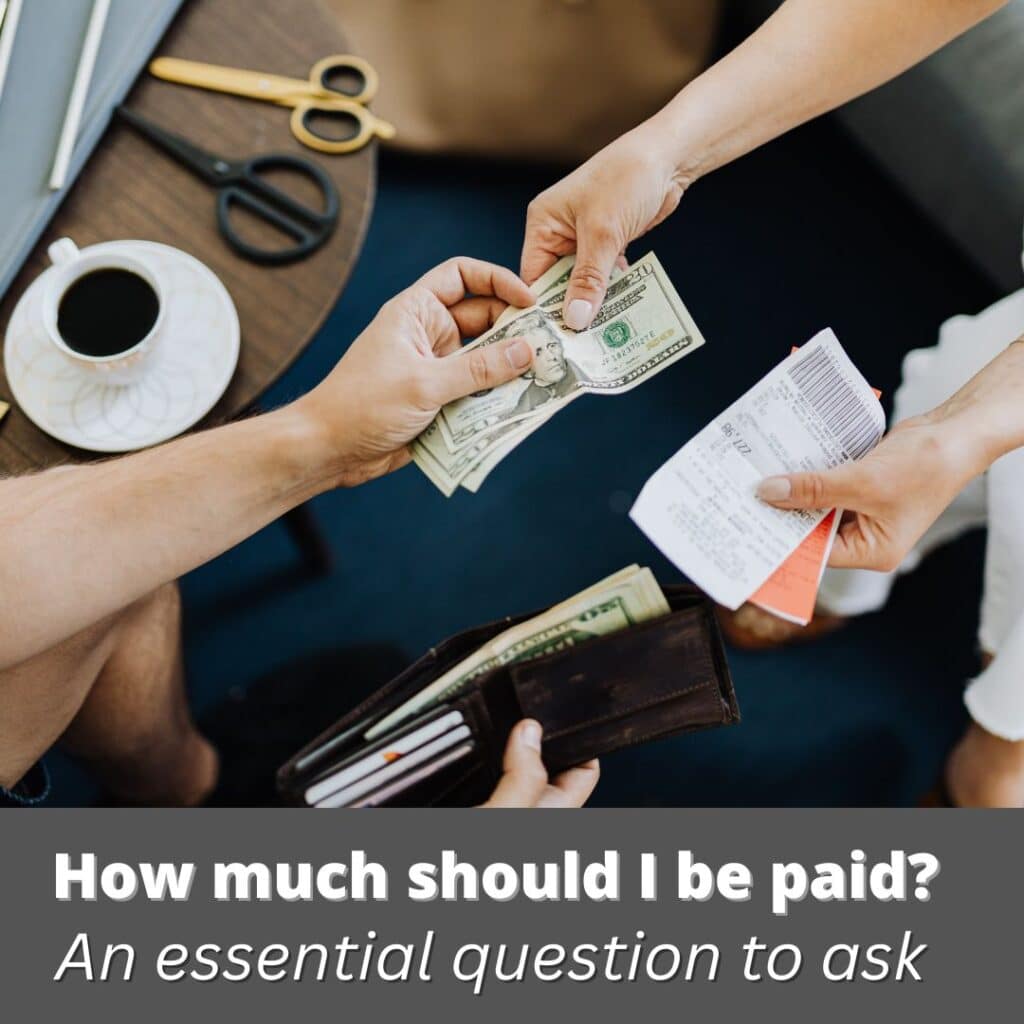
Dear reader, have you ever asked yourself the question, “How much should I be paid?” Probably is the answer, I would guess. Most people do at some point. Indeed, it’s a question I’ve asked myself many times.
We live in challenging economic times, so we’re all keen to ensure that we earn as much as we can. The question is, how much?
What is work?
In the modern age, people often prioritise their careers, losing sight of what work is truly about.
A career is a natural progression of jobs within a given profession or industry, through which we develop our skills and gain experience over time. Each of those jobs represents work.
In simple terms, work is just doing something for someone in return for money. Essentially, we provide a service or solve a problem, and an employer is our customer.
We’re paid to deliver results for the employer, with a strong emphasis on delivery.

How much should I be paid?
The financial reward you get for the work you do is based on two things:
- The value you can add, and
- The laws of supply and demand (also known as the market rate).
The value you can add is directly proportional to the skills you have and your knowledge and experience of the profession or industry in which you are seeking to work.
The supply and demand for your skills and experience within the job market will dictate how much an employer will be prepared to pay.
Why don’t businesses pay people more?
Essentially, labour is a commodity. By definition, a commodity is something that can only be differentiated in terms of price.
None of us will pay more for a commodity than necessary.
For example, suppose you want to buy a loaf of bread, and in one store, it costs $1, while in another store, the same loaf costs $1.50. Which store will you buy from? The $1 store, obviously, because that’s what any rational person would do. Why would anyone pay more than they must?
Businesspeople think in the same way.
Businesses exist to make a profit. Profit is sales income less costs, and, almost always, the biggest cost for any business is the cost of labour.
So, businesses will not pay any more than they must for people. Why would anyone expect it to be otherwise?
An employer doesn’t care about what you think you’re worth.
Your worth to the business will be judged solely on the potential value you can add, as well as the availability and demand for your skills and experience.
How do I measure the value I add?
Essentially, value is another way of saying your skills and experience, dear reader.
Alternatively, for an entry-level job, your value would be your potential.
If an employer is seeking a junior staff member for training, then your aptitude and qualifications would be a proxy for the value you could potentially add once your training has been completed.
I think I’m worth more:
If you think you’re being paid less than you deserve, then you have two options:
- Go to your boss and request a raise, or
- Test the (job) market.
Either way, you need to do your homework first.
Request a raise:
Before speaking to your boss about a raise, do some basic research on pay rates for similar jobs to yours with a requirement for the same skills and experience that you offer.
Also, identify at least three significant things that you do in your current role that make a real difference to the company. Ideally, these should be things only you can do.
Also, consider how you can do those things you do best more efficiently to enhance your productivity.
Test the market:
Even if you’re otherwise happy with your current employer, it can be worth putting yourself about a bit in the job market to see what other companies would be willing to pay you.
Apply for some other jobs and see what companies are willing to pay you.
And remember, most companies know that they’ll have to offer an uplift of at least 20% on your current salary to persuade you to take the risk of leaving your current employer, certainly if you’re highly skilled.
Once you’ve received a suitable offer, you then have two choices.
Either you accept the offer and move to the new employer, or you take that offer to your current employer and see whether they’re willing to match it.
I have done this more than once, and it does work.
Given the cost to the employer of losing a highly valued member of the team, most employers will match an offer rather than lose you.
And if they’re willing to let you leave, then they didn’t value you, and therefore, you might as well go.
How do I earn more?
Another way to think about this is, how do you make yourself more valuable?
You should continually build your value.
If you want to earn more, then learn more.
Work hard on building your experience as well. Be willing and ready to accept new challenges, however daunting, for rough seas make skilled sailors.
Become the ‘go-to’ person for some activity that is perceived as valuable to the business.
Your focus should be on ‘what you’re becoming’ rather than any short-term gain, and eventually, you have a good chance of becoming very valuable.
Think about it this way. Whatever you’re doing, you’re just there to serve customers and solve problems for them.
There will always be customers for goods and services, some of which have yet to be invented. Goods and services are another way of saying problems customers have that need a solution, and you’re the provider of that solution.
The greater the skills and experience required to solve those problems, the more you will earn, assuming you have those skills and expertise.
Know the market rate:
Every business keeps a close eye on the market rates for given skills and experience. They do this to ensure that they’re not overpaying.
You should keep a close eye on market rates, too, to ensure that you’re not being underpaid for what you’re doing.
In short, you must be very disciplined and businesslike in your approach to work and selling your skills.
Think of yourself as a small business providing goods and services to your boss, your colleagues, and the customers of the company for which you work.
Conclusion:
You won’t get paid more than you’re worth.
However, if you continually increase your value by learning and building your skills and experience, you can earn more.
Choose a highly skilled discipline with high demand and an undersupply of potential candidates, and you can earn a lot of money.

Please share this post on social media:
If you found this article helpful, please share it on social media with your friends.
When you share, everyone wins.
Please share it now, and I’ll be ever so grateful. You’ll be helping a keen blogger reach a wider audience.
I appreciate your support. Thank you.
Articles that might also appeal to you:
- How to build wealth from nothing: 5 Top Tips
- The secret to happiness that everyone should know
- Why you must earn before you spend
- 15 Things Poor People Do That The Rich Don’t
- 5 secret steps to tackling life and achieving success
- How to deal with criticism in the workplace
- The importance of teaching children about money
- Creating a Life Plan: 17 ways the rich think differently
- The importance of change and the opportunities it brings
- Life is short: Here’s what’s important to you today
- How is success achieved? Could this be the secret?
- How to improve your life quality and have much more
- The real cost of television? The answer will surprise you
- The debate about identity politics and how we get beyond it
- How to know your life purpose in 5 minutes
- 21 common sayings and what they all mean
- 15 quotes to emphasize the importance of time management
- The way to discover your true potential
© Mann Island Media Limited 2025. All rights reserved.


